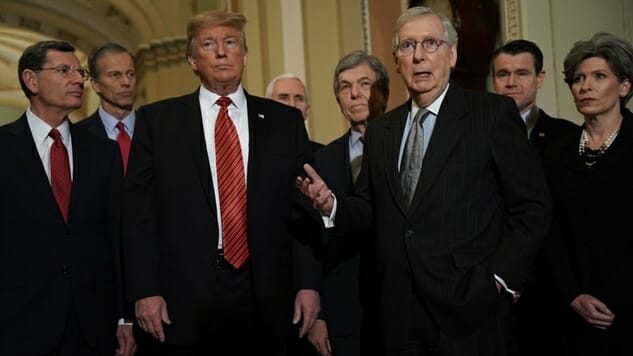The Shutdown Could Delay Tax Refunds, Have Serious Electoral Consequences
Photo by Alex Wong/Getty
First off, this isn’t a government shutdown. Lockheed Martin’s checks are still clearing and Wall Street can still get overnight loans from the Fed at 0% interest. This is a safety net shutdown. The commonality among the “nonessential services” that are shut down right now is they almost all service the non-rich.
Secondly, remember last year’s three-day shutdown? No? What about the Ted Cruz-led one from 2013 that was the second longest shutdown since 1980? How about the longest shutdown since 1980 (save for this current one), which spanned 21 days between 1995 to 1996 under Bill Clinton? If your answer is yes, congratulations on being a political junkie with an irrevocably broken brain like the rest of us here at Paste politics. If your answer is no, or you’re a little hazy on the details, you’re like most normal people. There has never been a government shutdown that had a measurable impact on the next election.
Hell, we barely talked about last year’s government shutdown during last year’s midterm elections, and a cursory review of shutdown history proves that this simply never becomes an issue during election season. That said, this shutdown could finally buck that trend. Per The Washington Post:
Hundreds of Internal Revenue Service employees have received permission to skip work during the partial government shutdown due to financial hardship, and union leaders said Tuesday that they expected absences to surge as part of a coordinated protest that could hamper the government’s ability to process taxpayer refunds on time.
I don’t know about you, but I sure count on my federal tax refund every year. In 2017, just six percent of respondents said that they would use their tax refund on splurges, while 57% said they will use it to either pay down debt or pay for basic expenses. If the government shutdown stretches to a point where the IRS will be late delivering our refunds, a majority of Americans will face unexpected financial hardship. That’s very very bad for President (Can’t Make) Deals and Senate Majority Leader Mitch McConnell (who could pass the CR bill that the Senate already passed 100-0 whenever he wants, and reopen the government), who is also up for reelection in 2020.
In fact, this anxiety over tax season can be seen in the WaPo report itself, as the piece seems to occasionally frame this organization by labor in a negative light. Compare the second paragraph of the piece describing Trump’s efforts to mitigate the damage that he’s doing (emphasis mine):
The Trump administration last week ordered at least 30,000 IRS workers back to their offices, where they have been working to process refunds without pay. It was one of the biggest steps the government has taken to mitigate the shutdown’s impact on Americans’ lives.
To a sentence like this:
The move is the leading edge of pushback from within the IRS, and it signals the potential for civil servants to take actions that could slow or cripple government functions as the shutdown’s political stalemate continues in Washington.
Civil servants can “slow or cripple government functions,” but Trump is trying to “mitigate the shutdown’s impact on Americans’ lives.” This juxtaposition is emblematic of a larger mindset in America where executives are treated with far more reverence than the labor implementing the executives’ vision. While this piece is almost unanimously focused on reporting the labor side of things in the shutdown, and that is the main explanation for why WaPo framed the piece this way, it still has echoes of our larger capitalist mindset: millionaires and billionaires are geniuses who innovate and create jobs, while those working for them can only help or get in the way of things.
Regardless, the frustration with this shutdown is evident everywhere you look. This was also true in 2013 and 1996, but the difference is that those shutdowns did not last long enough to have a measurable lasting impact. While it’s difficult for even politics junkies like us to concretely connect shutdown politics to electoral politics, this ticking time bomb with the IRS draws a direct line between Trump’s idiocy and people’s bank accounts. If there is one lesson from American history that even Donald Trump can wrap his tiny brain around, it’s that when people lose money due to the incompetence of democratically-elected leaders, they usually vote those leaders out of office the next chance they get.
Jacob Weindling is a staff writer for Paste politics. Follow him on Twitter at @Jakeweindling.







































